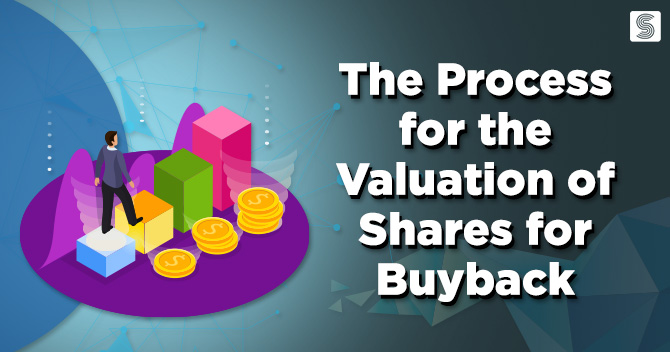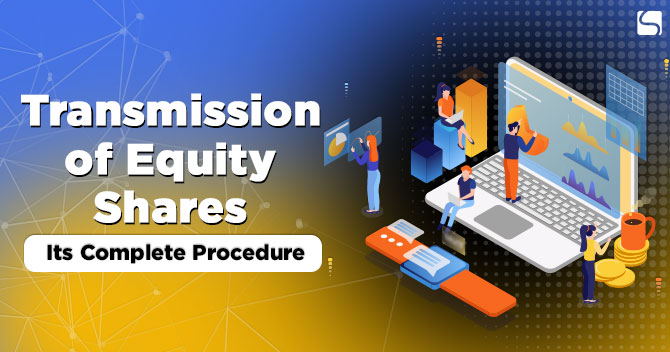The Process for the Valuation of Shares for Buyback

Shivani Jain | Updated: Apr 29, 2020 | Category: SEBI Advisory
Buyback of shares is opposite and contrary to the issue of shares by a company. The reason behind the same is that in the case of buyback of shares, instead of giving shares, the concerned company offers to buy back its shares owned by the investors, that too, at a specified price, which is normally at a premium over the prevailing market price. Like everything,even the valuation of shares for Buyback is different and distinct from the valuation of equity shares.
Further, Buyback of Shares is one of the most significant processes which profits both the company and the owner of the shares, i.e., investors. Furthermore, Buyback of shares provides a great and ample opportunity for the shareholder to get premium over the shares owned by them just by selling them directly to the company. However, it is crucial for a shareholder to do valuation of shares for buyback of a company before going for the buyback offer.
Table of Contents
Things to Ponder before going for the Buyback of Shares
The following listed are some of the essential aspects to ponderbefore going for the buyback of share –
- Buyback Price – Buyback of Shares comes with a price component. The buyback price is one of the most significant factors to check before investing inan offer of buyback. Further, the price of the Buybackis that factor that tells a shareowner about the exact price at which the company will repurchase each share. Furthermore, the buyback price also assists in determining whether the offer of buyback is providing profit or not, andif yes, then what is the profit percentage.
- Premium on Buyback of Shares–Premium on Buyback is yet another extremely significant factor to ponder before jumping into the offer of buyback. Further, the premium on buyback is a difference between the price of buyback and the share price of the company’s stock at the date of the Buyback offer.
While getting into a buyback deal,onemust also consider the potential of the shares that he or sheis holding of the company.
If in case the market suggests that the Company’s stock will offer better returns than the premium offered by the concerned company, then in this case, one can reconsider getting into the buyback offer.
- Dates in Buyback offer – The offer of the Buyback is the process that consists of multiple dates. Such dates include Announcement Date, Buyback Approval Date, Date of Tender Forms verification, Buyback Opening Date, Closing Date, Bids Settlement date. Hence, all of these dates have their importanceand significance.
- Size of Buyback -The buyback size shows the number of shares that the company is willing to withdraw from the market. Further, this also indicates the amount of money that a company is ready to provide to the shareholders.
Why does a company choose Buyback of Shares?
The following listed are the reasons as to why does a company chooses the option of buyback –
- Surplus cash- Whenever the company concerned has a substantial amount of cash, and there are not many worthwhile projects on its table. Moreover,it is also not interested in disbursing cash to its shareholders in the form of dividends, then the way out for most of the companies is to buy back its shares.
- Internal difference– At times, shareholders have a contrasting viewpoint from the company’s management. If they are in the majority, they might create an obstacle or hurdle to the company’s growth. Hence, buyback of shares is a way out for boosting the controlling stake for the management within the company. Further, the shares bought under this system does not go back to the promoters, but are held as treasury stock by the company. The reason for storing it as treasury stock is that the same could either be resold or even used for the employees’ stock option schemes.
How buyback of shares will benefit the investors?
The following listed are the reasons as to how buyback of shares will benefit the investors –
- High share value if onedoes not sell back- One of the most common ways out of computing the company’s performance is through EPS (Earnings Per Share). A higher EPS means that theshares “Intrinsic Value”is also high; this, in return, increases the value of shares held by the investor. Further, by means of the repurchasing route, the outstanding number of shares reduces and, thus,results in boosting the EPS.
- Tax shield– The offer of buyback provides a tax shield for the investors. This is because if in case the company were to declare dividends, the investors concerned would have to pay a tax on that.
Modes of buyback of shares
There are primarily two modes of buyback –
- Fixed Price Tender Offer, and
- Open Market Buyback.
In the fixed price tender offer, the company concerned may present its shareholders with a formal tender offer, in which they have the offer to submit a part of their shares that too, within a certain period, and at a certain price, which is usually at a 15 to 20 percent premium over the prevailing market price.
Whereas in the latter case, the company declares a band price for the buyback and purchases the shares from the market at the market price, subject to the specified rules. Further, in India, the former is mostly preferred due to the high amount of cash engaged in buyback transactions.
How to do Valuation of Shares for Buyback?
Although buyback of shares can be a fantastic chance to sell one’s shares at a premium and also to get good returns but on the other hand, it is noteworthy to note that one could even stand to lose out on the company’s future growth. Hence, it is essential for an investor to do valuation of shares for buyback before going in the offer of buyback. The following listed are the significant aspects to ponder for the valuation of shares for buyback –
- Offer price– One of the most crucial factors in the valuation of shares for buyback is the offer price. Is the offer price of the buyback significantly higher than the prevailing market price of the stock? If the said answer is no, then one may not benefit a great deal from the buyback. However, one should also remember that if in case onehas held the shares for a period less than a year, then one would also be required to pay a short-term capital gains tax of 15 percent.
- Use of excess money for buyback–Another factor to consider for the valuation of shares for buyback is whether a company using excess money for buyback or not. Further, surplus cash on the company’s balance sheet does not look good as it depicts that the concerned company is inefficient in utilizing its assets. Moreover, if a company does not have many worthwhile projects for the near future, it may consider or ponderfor utilizing the cash to buy back its shares from shareholders. Hence, if in case a company does not have any future growth potential, it will be better to participate in the process of buyback and sell your shares.
- Future potential growth–Last but not least significant factor for the valuation of shares forbuyback is to see the company’s future potential growth. If in case the company has solid fundamentals and the concerned shareholderis looking for long-term growth, it may be best to hold onto the stock and ignore the offer of buyback. Asin this case, the future growth potential will be better than the returns earned by the shareholder in the short term.
Conclusion
Buyback of shares provides a great and ample opportunity for the shareholder to get premium over the shares owned by them just by selling them directly to the company. However, it is crucial for a shareholder to do valuation of shares for buyback of a company before going for the buyback offer. The factors to take into consideration for the valuation of shares for buyback include offer price, use of excess money for buyback, and company’s future potential growth.
Also, Read: Buyback of Shares: A Detailed Analysis.














